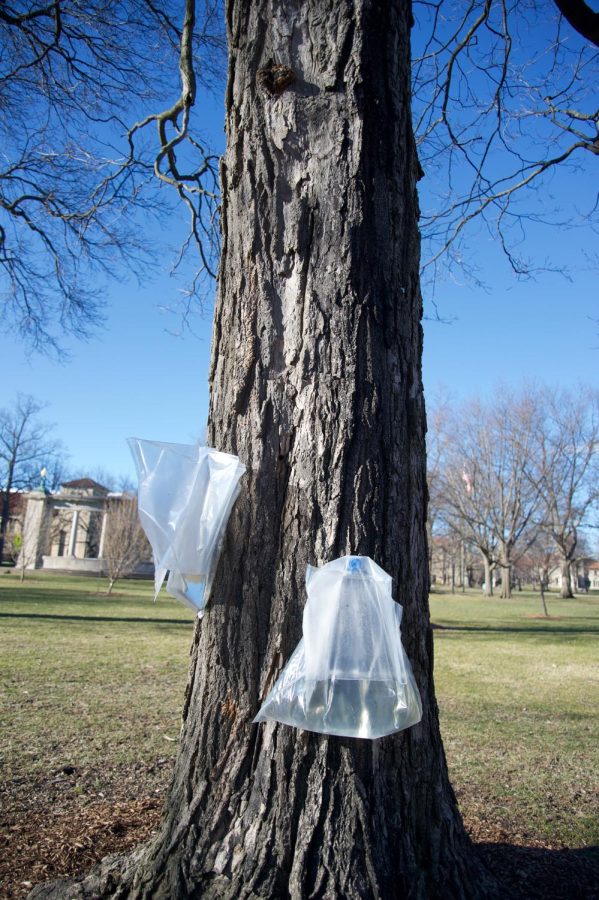Maple Crew Gives Students Seasonal Opportunity To Engage with Land, Community
Bags gather maple sap in Tappan Square.
Since coming to college, I have found it harder and harder to spend time outside. My days are packed. I run from activity to activity with barely enough time to do my laundry or eat breakfast, much less think about making time to take a walk or sit in the sun. It doesn’t help that college life is not necessarily conducive to a traditionally healthy lifestyle. College students around the country are notoriously malnourished, pallid, and just a little bit ill. On top of that, the image of students who spend their days and nights locked in dimly-lit rooms, surrounded by books or standing in front of chalkboards in an attempt to solve complicated equations, is a common one. A university schedule is just not built to accommodate the leisure time necessary for connecting with the natural world — but it should be.
Oberlin, however, has led me to outdoor experiences that challenge the popular indoor narrative. I recently had the opportunity to work as a member of the Maple Crew, which gives Oberlin students the seasonal opportunity to help David Dorsey, multifaith chaplain and director of the Office of Spirituality and Dialogue, and June Dorsey collect sap from the maple trees in Tappan Square and a few other locations around town. Maple Crew shifts involve collecting sap and bringing it to the “Sugar Shack” on David’s property as well as participating in “boiling shifts,” where students watch over the sap as it turns from sugar water to syrup.
Coming back from Winter Term, I was expecting the brutal Ohio winter I’d heard horror stories about. I had imagined myself huddled in my dorm room, heat on full blast, swaddled in blankets, gloved hands shaking as I struggled to turn the pages of my textbooks. Instead, I found myself discovering a part of Oberlin’s outdoor community that I had never seen before and didn’t even know existed. As I walked from Tappan Square into the town to collect maple syrup, I exited the Oberlin College community and entered an entirely new world. I had lived in Oberlin for almost eight months, yet I had no memory of walking down these streets.
On campus we live in a bubble, one that is difficult to see from the inside. It is incredibly easy to get wrapped up in collegiate life. Though writing essays and reading papers and doing math and learning the chemical compounds in a cup of vinegar are all important for academic success, the connections that we gain from exploring the world around us are fundamental for a well-rounded education.
I appreciate the opportunities Maple Crew has opened up for me to get in touch with the land and with my neighbors. I value the reminder it gave me to put a pause on my academic studies and get outside, to greet the trees with a large plastic syrup bucket in hand, to find nature and a community I didn’t even realize was out there.
As Oberlin students move out of college and enter the real world, it is important that we know how to find and create these enriching experiences for ourselves. Our habits in college inform how we interact with people around us after graduation. Figuring out how to make time in your day for wonder, excitement, and connection in a world increasingly dependent on technology and devoid of work-life balance is essential to producing good work and good ideas. The future of academia should not be a group of people sitting in a dark room staring at a screen, but rather passionately exchanging ideas over pancakes and maple syrup in the sun.


